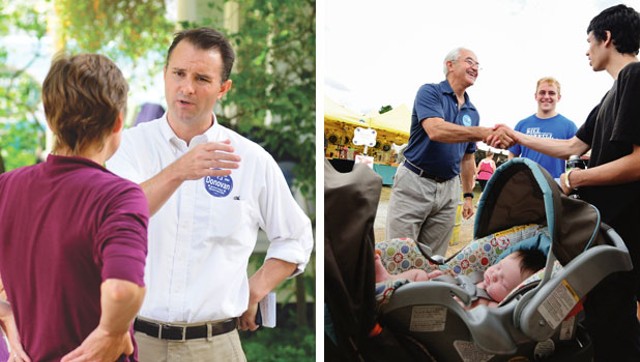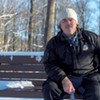Published August 1, 2012 at 10:47 a.m.
Fair Game is Seven Days’ weekly political column.
Nothing tops off a lazy summer evening like a phone call from an out-of-state pollster. Two supporters of Attorney General Bill Sorrell’s reelection campaign say they both recently took part in a telephone survey they characterized as a “push poll.”
“From the second or third question it became obvious what was going on,” says Neil Marinello, a retired psychologist from Woodstock who favors Sorrell over rival T.J. Donovan, the Chittenden County state’s attorney. “It was very clearly pushing people away from Sorrell and toward Donovan.”
Push polls are intended to float negative — and sometimes false — information about a candidate under the guise of a traditional scientific survey.
According to Marinello, the 15-minute poll included a number of questions containing negative assertions about a candidate who, while unnamed, appeared to be Sorrell. One question that did name the AG related to whether Sorrell should be blamed for the continued operation of the Vermont Yankee nuclear power plant.
While the pollster would not identify his employer, the North Carolina phone number displayed on Marinello’s caller ID appears to belong to Bernett Research, a Boston-based polling company.
Donovan confirmed that his campaign paid Washington, D.C.-based Lincoln Park Strategies $10,000 to conduct a 50-question, 12- to 15-minute poll two weeks ago. Lincoln Park president Stefan Hankin said his company subcontracted the job to Bernett.
But Donovan and Hankin both insist their poll was nothing less than a rigorous survey seeking to understand how Vermonters feel about various issues.
“It was a scientific poll. It was not a push poll. They are very different,” Donovan says. “More importantly, push polls don’t give you accurate information. They’re ineffective and offensive.”
But the difference between push polling and conventional message testing may not always be entirely clear to he or she who answers the call. Perhaps the best-known example of push-polling came during the 2000 Republican presidential primary, when George W. Bush’s campaign allegedly called thousands of South Carolina voters to ask whether they’d be more or less likely to vote for Sen. John McCain (R-Ariz.) if they knew he fathered an illegitimate black child — which, of course, he hadn’t.
“The purpose of a push poll is to get bad information out very quickly,” Hankin says. “We’re trying to learn what’s happening in Vermont among primary voters, what their thinking is and getting an understanding of the lay of the land, so the campaign can speak as effectively as possible to voters who will turn out in August.”
According to Hankin, Donovan’s survey of 400 Vermonters generally refrained from naming specific candidates, with the exception of one question related to Vermont Yankee, which asked which people or institutions were to blame for VY’s continued operation: Sorrell, Gov. Peter Shumlin or the state legislature. Donovan’s campaign declined to reveal the polling results — which they claim showed a “tight race” — or the wording of the poll’s questions, calling it “internal” information.
Sorrell’s campaign denounced the recent poll. “This type of polling and the types of questions that were asked related to us have no place in Vermont politics — particularly in a Democratic primary in Vermont,” campaign manager Mike Pieciak said Tuesday. “Until this morning, it was our understanding that this poll was done by the tobacco industry or Entergy or the Republican Attorneys General Association, so if it was in fact conducted by the Donovan campaign, we’re disappointed in them and ask that they cease this kind of polling.”
Donovan, however, was not apologetic.
“The crocodile tears by the Sorrell campaign are a little unsettling,” he responded. “We polled in order to glean information Vermonters care about. We are the campaign that has been a substantive campaign — that has released policy positions throughout the campaign. I don’t apologize for conducting a scientific poll.”
Too Many Questions?
Donovan’s is not the only recent poll to hit Vermont. The Vermont Press Bureau’s Peter Hirschfeld reported earlier this week that another recent poll appeared to be testing a slew of statewide candidates and issues. Hirschfeld was unable to determine its origin, but came to the conclusion based upon its wording that its source was “likely not a Democrat.”
A recent campaign finance filing by Sen. Vince Illuzzi (R-Essex/Orleans) showed that he, too, polled the AG race this spring when he considered running for the job, before opting to run for state auditor. Illuzzi said his $10,000 poll showed Sorrell “running strong” in a general election matchup, but for some reason, he didn’t test Donovan’s chances.
Senator on Senator
Three years ago, Sen. Philip Baruth (D-Chittenden) — then a lowly University of Vermont English professor and political blogger — set out to learn more about Vermont’s top political patriarch, Sen. Patrick Leahy (D-VT).
“He’s just been a colossus over the past 40 years, so all of a sudden I said to myself, ‘If I really wanted to find out what makes him tick, I’d read a biography on him,’” Baruth recalls. “And there was not only not a biography but not a book of any kind about Pat Leahy, and that just struck me as insane.”
So Baruth set about changing that. He approached Leahy’s Senate office with the idea of writing a political biography of a kid from Montpelier who grew up to become the second-most-senior member of the U.S. Senate. By the time Leahy’s office ok’d the concept last summer, Baruth himself had been elected to the Vermont state Senate, giving the author an inside look at what he calls the “amazing, gut-wrenching” experience of running a political campaign.
A year into the project, Baruth says he’s written 100 pages of what he expects to become a 400-page “targeted biography” focusing on the political arc of Leahy’s career — rather than “an exhaustive treatment of his years in the Senate.” So far he’s interviewed 20 people. He’s talked to Leahy three times.
Given his academic focus on 18th-century literature, Baruth says he’s enjoying drawing from so many living sources. But he learned not to take that for granted: Last fall, former congressman Dick Mallary — Leahy’s 1974 Senate opponent — died the day after Baruth scheduled an interview with him.
While the biographer says Leahy will see a draft of the manuscript, Baruth maintains that it won’t be just a propaganda piece written by one Vermont Dem about another.
“I hope everyone who’s read my writing knows that I call them the way I see them,” he says. “To my mind, it’s hard to see me writing something that [Leahy] would find really objectionable, because I’ve been a student of his career and find it highly admirable. But there’s no portrait that’s worth its weight that doesn’t have a little shading in it.”
Hot Water
Vermont Public Radio’s typically staid commentary series generated a bit of a driveway moment last Wednesday — and not the good kind.
At the tail end of VPR’s local “All Things Considered” newscast, Montpelier storyteller and longtime VPR commentator Willem Lange made use of an ethnic slur to describe a friend with whom he worked on a west Texas ranch in 1953.
“Juan was a wetback from Zacatecas, much more accustomed to heat than I was,” Lange said in a laconic meditation on the hot summer clime.
The use of the w-word didn’t sit well with John Van Hoesen, VPR’s vice president for news and programming: “I heard it and realized that we had made a serious mistake,” he says. “So we put the process in motion right away to remove it and take steps to apologize.”
As VTDigger.org’s Nat Rudarakanchana first reported, VPR immediately pulled the commentary from its website and issued an on-air apology during the same time slot the following afternoon. In a post on the station’s blog, commentary producer Betty Smith-Mastaler called it an “unfortunate instance of offensive racial slang” and included apologies from VPR and Lange.
So how’d the term get through VPR’s generally politically correct censors?
Van Hoesen says that commentaries are screened twice — first in a text-edit by Smith-Mastaler and then by a recording engineer who is “expected to keep an ear out.”
“So there’s a two-level process there, and this just slipped through, unfortunately,” he says.
Lange called it “a quite innocent use of the word,” maintaining that he “hadn’t realized it’s become, at least in some circles, something you would try to avoid.”
“When I learned the word, the wetbacks themselves were using it to describe themselves. They called themselves the ‘mojados’ — the wet ones,” Lange explains. “It wasn’t considered derogatory in any way, any more than ‘gringos,’ which is what they called me. But apparently over the decades it’s acquired some derogatory connotations, and I wasn’t aware of that.”
Wait, wait. Don’t tell me he just used it again! Sounds like Lange’s gotta get back to work on that one.
Media Notes
Vermont reporters are on the move. After three years at the twice-weekly Addison County Independent, reporter and online editor Andrea Suozzo is leaving to pursue a master’s in food systems at UVM. Fellow Addy Indy-ite Andrew Stein is leaving to take over the energy and health care beat at VTDigger.org.
Stein won’t be the only new face at the Statehouse this winter. Former Glens Falls Post-Star reporter David Taube recently became the third man on the Vermont Press Bureau totem pole. He’ll be covering both local and state stories for the Barre-Montpelier Times Argus and its sister paper, the Rutland Herald.
After nearly two years at VPR, Vermont Edition producer Samantha Fields is leaving the station this week to take a job at Maine Public Broadcasting Network.
On the management side, longtime Associated Press reporter Wilson Ring was officially named “supervisory correspondent” — translation: bureau chief — last month. Ring, who joined the AP in 1992, has been serving in the role on an interim basis since last September, when bureau chief John Curran died unexpectedly.
WPTZ-TV will soon find itself with a new/old boss, as well. When station president and general manager Paul Sands retires at the end of the year, he’ll be replaced by Kyle Grimes, who served as news director for Channel 5 from 2005 through 2008.
More By This Author
Speaking of...
-

Bernie Sanders Sits Down With 'Seven Days' to Talk About Aging Vermont
Apr 3, 2024 -

Progressive Burlington Mayor-Elect Mulvaney-Stanak Won by Picking Up Democratic Votes
Mar 12, 2024 -

Emma Mulvaney-Stanak Wins Burlington Mayoral Race
Mar 5, 2024 -

Progressives Flip Seat, But Democrats Keep Control of Burlington City Council
Mar 5, 2024 -

Vermont Communities Tackle Budgets, Bridges and Bonds on Town Meeting Day
Feb 21, 2024 - More »
Comments
Comments are closed.
From 2014-2020, Seven Days allowed readers to comment on all stories posted on our website. While we've appreciated the suggestions and insights, right now Seven Days is prioritizing our core mission — producing high-quality, responsible local journalism — over moderating online debates between readers.
To criticize, correct or praise our reporting, please send us a letter to the editor or send us a tip. We’ll check it out and report the results.
Online comments may return when we have better tech tools for managing them. Thanks for reading.















































